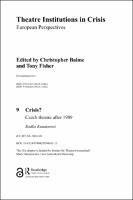Chapter 9 Crisis?
Proposal review
Czech theatre after 1989
| dc.contributor.author | Kunderová, Radka | |
| dc.date.accessioned | 2022-07-01T09:12:23Z | |
| dc.date.available | 2022-07-01T09:12:23Z | |
| dc.date.issued | 2021 | |
| dc.identifier.uri | https://library.oapen.org/handle/20.500.12657/57169 | |
| dc.description.abstract | The issue of (dis)continuity in the pre- and post-1989 situation has been a contentious one in the Czech public debate and intensely discussed particularly in the early 2010s. In the field of theatre, the question of (dis-)continuity has not been raised yet, though its answering might fundamentally shape future interpretations of the three post-1989 decades in Czech theatre. In general terms, Czech theatre historiography has devoted only minor attention to the issue of how the 1989 political events influenced theatre and its social relevance. In his text, Libor Vodicka conceptualises the situation of Czech theatre after 1989 as a crisis of theatre . His evaluation of the early 1990s strikes one as especially negative coming after a laudatory description of the preceding phase. Vodicka sees one factor contributing to the crisis of theatre in the chaos and inconsistency and decrease of subsidies coming from state institutions that, purportedly, significantly interfered with theatres operation. | en_US |
| dc.language | English | en_US |
| dc.subject.other | Culture, 1989 | en_US |
| dc.title | Chapter 9 Crisis? | en_US |
| dc.title.alternative | Czech theatre after 1989 | en_US |
| dc.type | chapter | |
| oapen.identifier.doi | 10.4324/9780429294167-13 | en_US |
| oapen.relation.isPublishedBy | 7b3c7b10-5b1e-40b3-860e-c6dd5197f0bb | en_US |
| oapen.relation.isPartOfBook | 6a3023b3-4819-487e-9719-018e5718eb8d | en_US |
| oapen.relation.isbn | 9780367266103 | en_US |
| oapen.relation.isbn | 9780367676667 | en_US |
| oapen.imprint | Routledge | en_US |
| oapen.pages | 11 | en_US |
| oapen.remark.public | Funder name: Institut für Theaterwissenschaft – Marie Skłodowska Curie Individual Fellowship | |
| peerreview.anonymity | Single-anonymised | |
| peerreview.id | bc80075c-96cc-4740-a9f3-a234bc2598f1 | |
| peerreview.open.review | No | |
| peerreview.publish.responsibility | Publisher | |
| peerreview.review.stage | Pre-publication | |
| peerreview.review.type | Proposal | |
| peerreview.reviewer.type | Internal editor | |
| peerreview.reviewer.type | External peer reviewer | |
| peerreview.title | Proposal review | |
| oapen.review.comments | Taylor & Francis open access titles are reviewed as a minimum at proposal stage by at least two external peer reviewers and an internal editor (additional reviews may be sought and additional content reviewed as required). |

